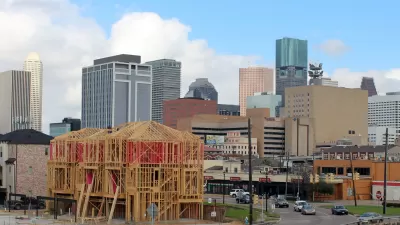A conversation with an architect yields insight into how Houston's pride in the lack of traditional land use regulation mechanisms has created the city as it exists today.

The Rice Design Alliance recently awarded its Spotlight Prize, recognizing up-and-coming architects, to the firm Oualalou + Choi, located in Paris and Casablanca. To commemorate the award, the Houston Chronicle excerpted an interview between Raj Mankad, of the Rice Design Alliance, interviewed Tarik Oualalou. The interview was originally published by the Houston-based architecture and design magazine Cite.
A few of the key excerpts from the interview, in which Mankad and Oualalou examine the city's land use regimes for insight into the city's built form. The interview, especially the portion excerpted in the Houston Chronicle, offers interesting opinions on the effects of planning and land use in this uniquely governed city, all from an architect's perspective:
- "You see spurts of building in short periods of time. So it's very dated. You see a lot of things in the late '70s, and then not in the '80s, a lot of things in the early '90s, and then not. These spurts of construction in short periods of time give it a very dated figure, almost like it's frozen in time….. It's not a city that builds over time. It just builds in moments. It creates a weird "stroboscopic" feel."
- "If there's no counter power, if there's no state, if there's no city, if there's no municipal system, if there's no public desire, organized public desire of sorts — whether it's community or elected or whatever it is — then the developer has no counter power."
FULL STORY: “Our responsibility as architects is to invent the form of public-ness:” An Interview of Tarik Oualalou

Planetizen Federal Action Tracker
A weekly monitor of how Trump’s orders and actions are impacting planners and planning in America.

Chicago’s Ghost Rails
Just beneath the surface of the modern city lie the remnants of its expansive early 20th-century streetcar system.

San Antonio and Austin are Fusing Into one Massive Megaregion
The region spanning the two central Texas cities is growing fast, posing challenges for local infrastructure and water supplies.

Since Zion's Shuttles Went Electric “The Smog is Gone”
Visitors to Zion National Park can enjoy the canyon via the nation’s first fully electric park shuttle system.

Trump Distributing DOT Safety Funds at 1/10 Rate of Biden
Funds for Safe Streets and other transportation safety and equity programs are being held up by administrative reviews and conflicts with the Trump administration’s priorities.

German Cities Subsidize Taxis for Women Amid Wave of Violence
Free or low-cost taxi rides can help women navigate cities more safely, but critics say the programs don't address the root causes of violence against women.
Urban Design for Planners 1: Software Tools
This six-course series explores essential urban design concepts using open source software and equips planners with the tools they need to participate fully in the urban design process.
Planning for Universal Design
Learn the tools for implementing Universal Design in planning regulations.
planning NEXT
Appalachian Highlands Housing Partners
Mpact (founded as Rail~Volution)
City of Camden Redevelopment Agency
City of Astoria
City of Portland
City of Laramie





























